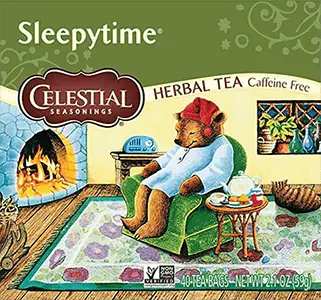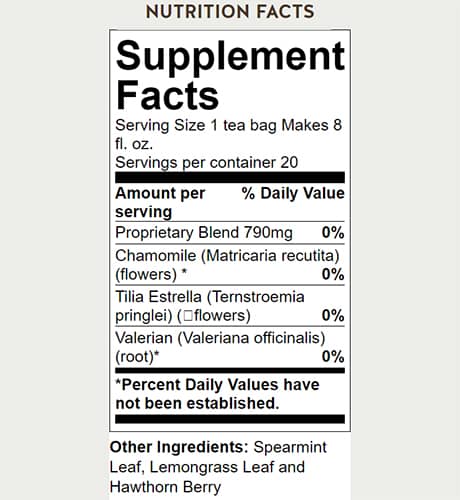Introduction
While pregnancy can bring about a great change to a woman’s body and health, one must stay healthy to carry your baby to term. Many believe herbal teas can support optimal health since they are “natural” and provide essential nutrients, and they decide to go for them. However, during pregnancy, there is concern about the interaction of these herbal teas with the cellular development going on in your fetus.
An example of such herbal tea is Sleepytime tea, a sleep aid. What you may not be aware of is that, is sleepytime tea safe during pregnancy?
That is why you have landed on this page to learn more about Sleepytime tea and if it is safe to drink while pregnant.
This article is researched based. Hours have been spent looking into the composition of sleepytime tea, what studies say about them, and its implication for pregnant women.
More insight is also covered on the importance of sleep during pregnancy and the effect of sleep deprivation on your health, labor, and delivery.
Keep on reading to learn exhaustively about sleepytime tea, also called chamomile tea, because of the active ingredient chamomile it contains.
What is Sleepytime Tea?
Sleepytime tea is a relaxing herbal tea produced by Celestial Seasonings (Hain Celestial Group). This company specializes in a wide range of herbal tea products acclaimed to be GMO and preservatives FREE.
Sleepytime claims to use a combination of soothing herbs and a “natural sleep aid” to give a calm, soothing feeling just at bedtime. These components interact with neurotransmitters involved in sleep, thereby inducing sleep.
While there are many claims that drinking sleepytime tea before bed helps improve sleep quality, everyone’s circadian cycle is different, and the effect may be felt differently.
Sleep and Pregnancy – What Association do they have?
When it comes to sleep and pregnancy, it takes a little twist.
Pregnancy is associated with a lot of activities and changes going on within our bodies as women.
From body changes to mood swings and cravings for food, including sweetened fruits and beverages like cherries, apple cider vinegar, and Gatorade while pregnant, to managing the jerky spastic fetal movement and still being involved in home management. These could weigh you down and lead to sleep deprivation (4).
Beyond these factors, other preexisting conditions may exist before you took in and are now affecting your sleep cycle even more.
As a pregnant woman, you need regular daily sleep for optimal health and safer delivery, especially in your third trimester.
Lack of sleep during pregnancy can predispose you to the risks of developing pregnancy complications such as:
- Preeclampsia (2) – a blood pressure condition that causes high blood pressure and high level of protein in the urine
- Gestational diabetes mellitus (GDM) (3) – high blood sugar caused by the interaction of the hormones produced in the placenta, blocking the effect of insulin. This can affect your pregnancy and your baby’s health.
Lack of sleep could also affect your labor and delivery, such as experiencing:
- longer labor hours
- increased perception of pain during labor
- discomfort during labor, and
- preterm labor
The recommended sleep hours a pregnant woman should get is between 7 – 9 hours.
Sleeping for shorter hours (less than 6 hours), especially in the third trimester, would mean you are experiencing sleep deprivation which could lead to longer labor hours, and you should catch more sleep.
That is why you may have been researching about taking sleepytime tea and if it is safe while pregnant.
Before taking a dive at sleepytime tea during pregnancy, I’ll highlight ways to catch sleep while pregnant.

Best ways to catch sleep while pregnant
- Getting involved in exercises – regular exercises during pregnancy can help you fall asleep pretty easily.
- Practice relaxation techniques – while sleepytea tries to imitate making you relaxed by its effect, practicing it yourself naturally helps better. Some relaxation techniques include yoga, prenatal massage, and taking deep breaths.
- Adjust your sleep environment – a dark and quiet room can help encourage sleep. The sleep hormone melatonin is produced when the environment is dark.
- Going tanning – tanning while pregnant, which has its pros and cons, greatly contributes to improving sleep quality as it enhances the secretion of melatonin hormone at night.
Herbal Teas and Sleep – Sleepytime tea in Review
A handful of herbal herbs promises to promote better sleep quality. But taking them when pregnant may not be a good idea.
These teas may contain ingredients that interact with your body system and can cause changes that affect pregnancy.
Sleepytime tea in question contains chamomile, an ancient medicinal herb that contains terpenoids and flavonoids and is used for many ailments such as muscle spasms, menstrual disorders, hay fever, rheumatic pain, gastrointestinal disorders, and lots more.(5)
What does Sleepytime tea Contain?

Sleepytime tea contains:
- Proprietary Blend
- Chamomile (flowers) (German chamomile)
- Tilia Estrella (flowers)
- Valerian (root) (sleep aid)
- Spearmint leaf
- Lemongrass leaf, and
- Hawthorn berry
According to Celestial Seasonings, pregnant or nursing mothers are not recommended to take sleepytime tea without first consulting with a health care provider.
Nonetheless, sleepytime tea is not safe during pregnancy. This is because of the ingredient chamomile, which interacts with the uterine muscles and causes them to contract.
Interaction of Each Ingredient with Pregnancy
- Proprietary Blend – technically, a proprietary blend is a company’s trade secret that enables them to keep you from knowing the quantities and ratios of ingredients used in the formulation of a supplement. The implication is that it is hard to tell which ingredient may be causing a negative interaction with your system if you are having a reaction from using such a product.
- Chamomile (flowers) – studies (6,7,8) have shown that regular use of chamomile results in a higher incidence of preterm labor or miscarriage. Some of the reported effects of chamomile in pregnant women include prenatal constricted ductus arteriosus (9,10,11) on the fetus, a condition that causes right heart failure, fetal hydrops (a life-threatening condition where an abnormal amount of fluid accumulates in some body areas of the fetus), and intrauterine death (miscarriage). One of the studies reported that the use of chamomile tea is similar to the effect of nonsteroidal anti-inflammatory drugs (NSAIDs), which are also known to cause ductal constriction.
- Tilia Estrella (flowers) – also known as linden, helps promote relaxation. However, there aren’t many studies about its interaction with pregnancy. There are still caution that linden should be avoided when pregnant and breastfeeding. Linden is also known to interact with other medications and cause complications such as heart damage and other conditions.
- Valerian (root) – is a sleep aid that helps to calm the mind and relax the body. Taking it when pregnant is highly not recommended. A study (13) revealed that valerian taken during pregnancy can cause a significant decrease in zinc levels in the fetal brain and should be limited when pregnant.
- Spearmint leaf – spearmint can cause damage to the uterus when taken in large quantities. As such, it should be avoided during pregnancy.
- Lemongrass leaf – contains two compounds, citral, and myrcene, which have been shown to cause congenital disabilities (14). Lemongrass also has anti-mitotic and apoptotic effects, meaning they destroy cells, which is not good for a growing fetus. This ingredient is also culpable of starting menstrual flow, even while pregnant.
- Hawthorn berry – there is little or no research on the interaction of hawthorn berry with pregnancy; however, medical sources recommend that it should be avoided when pregnant or breastfeeding.
Is Sleepytime Tea Safe During Pregnancy?
By the interaction of each ingredient contained in sleepytime with pregnancy, especially chamomile, it can be established that sleepytime is unsafe during pregnancy as it poses adverse prenatal outcomes.
In summary, chamomile in sleepytea (during pregnancy) is responsible:
- preterm labor
- lower birth weight
- right heart failure of the fetus
- fetal hydrops
- intrauterine death (miscarriage)
During breastfeeding (12):
- breast engorgement (swelling, tightness, and increase in the size of the breasts)
- significant (50%) increase in milk production
Beyond chamomile, which it contains, the other ingredients also have negative interactions with pregnancy.
Therefore, you should as much as possible avoid sleepytime tea when pregnant.
There are also other herbal teas you should avoid when pregnant. These are teas that cause miscarriage when pregnant.
On the other hand, there are some things to avoid doing when taking a pregnancy test.
FAQs
Can I drink chamomile tea while pregnant first trimester?
You may not need to take any sleeping aid in your first trimester of pregnancy since, naturally, a high amount of hormone in your system triggers you to sleep more often than usual. However, chamomile tea should be avoided at all stages of pregnancy.
Can I drink Chamomile tea during pregnancy second trimester?
Chamomile tea should be avoided in the second semester of pregnancy and the other trimester. It is not safe to take chamomile tea during pregnancy.
Can I drink chamomile tea during pregnancy third trimester?
The third trimester happens to be the period when sleep deprivation happens the most during pregnancy. This period is also when you need sleep most to aid your labor and delivery. However, sleepytime tea and chamomile tea are not safe during all stages of pregnancy and should be avoided.
Final Thoughts
Haven went through the ingredients used in sleepytime tea exhaustively; it can be concluded beyond doubt that sleepytime tea is not safe during pregnancy.
On the other hand, many of the ingredients should be avoided in their single form as herbal teas.
Before taking any herbal tea during pregnancy, ensure to do extensive research about such tea and talk to your doctor. Pregnancy is a delicate period, and you want to stay healthy for yourself and your baby.
References
(2) Preeclampsia: Symptoms, Causes, Treatments & Prevention
(3) GDM: Gestational diabetes
(4) Sleep deprivation: Sleep Deprivation during Pregnancy and Maternal and Fetal Outcomes
(5) Chamomile: Chamomile: A herbal medicine of the past with bright future
(6,7,8) Studies on herbal teas: (6)Frequently Used Herbal Teas During Pregnancy, (7)Use of herbal products among 392 Italian pregnant women: focus on pregnancy outcome, (8)Herbal Medicinal Product Use During Pregnancy and the Postnatal Period
(9,10,11) Prenatal constricted ductus arteriosus: (9)Fetal ductus arteriosus constriction – case report, (10)Idiopathic constriction of the fetal ductus arteriosus, (11)Prenatal constriction of the fetal ductus arteriosus
(12) Breastfeeding: Chamomile reveals to be a potent galactagogue
(13) Study on valerian: Effects of valerian consumption during pregnancy
(14) congenital disabilities from lemongrass: Lemongrass




